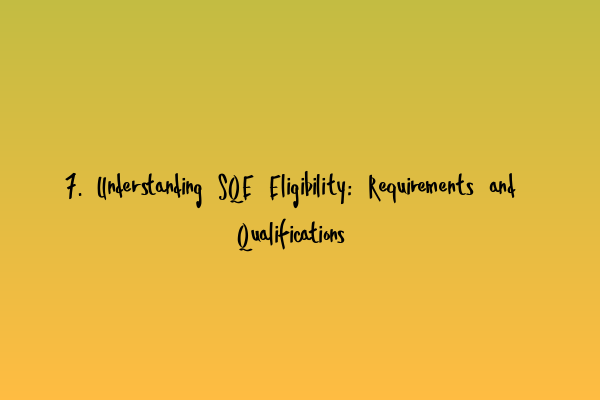7. Understanding SQE Eligibility: Requirements and Qualifications
Are you considering a career in law? The Solicitors Qualifying Examination (SQE) is an important milestone on your journey to becoming a qualified solicitor in England and Wales. To ensure you meet the eligibility criteria, it’s crucial to understand the requirements and qualifications necessary to sit for the SQE. In this article, we will guide you through the key aspects of SQE eligibility, helping you navigate this important stage of your legal career.
1. Educational Qualifications
One of the primary eligibility requirements for the SQE is to hold a degree or an equivalent qualification. The Solicitors Regulation Authority (SRA), the governing body responsible for the SQE, acknowledges a wide range of degrees, including law degrees, non-law degrees, and qualifications from non-UK jurisdictions. However, it’s important to note that if you hold a non-UK qualification, you will need to have it assessed by the SRA to ensure it meets their criteria.
For more detailed guidance on educational qualifications, refer to our article on Demystifying the SQE Exam Pattern: Knowing What to Expect.
2. Work Experience
In addition to educational qualifications, the SRA requires applicants to demonstrate relevant work experience. The purpose of this requirement is to ensure that candidates have a practical understanding of the legal profession and the day-to-day responsibilities of a solicitor.
The specific work experience requirements may vary depending on your individual circumstances. Generally, the SRA recommends a minimum of two years’ full-time equivalent experience or its part-time equivalent. This can include legal work, work in a non-legal context that is directly related to the legal profession, or work in roles that develop transferable skills relevant to the legal sector.
For more information on how to gain relevant work experience and maximize its impact on your SQE preparation, read our article on SQE Case Studies: Applying Knowledge in Real-Life Scenarios.
3. Character and Suitability
The SRA places great importance on the character and suitability of individuals entering the legal profession. As an aspiring solicitor, you will need to meet certain standards of honesty, integrity, and professionalism. The SRA will assess your character and suitability through a detailed application process, which may include background checks, references, and disclosures.
4. English Language Proficiency
Since the SQE is administered in English, it is essential to possess a high level of English language proficiency. The SRA requires all candidates to demonstrate their ability to communicate effectively in English, both in written and verbal forms. This requirement ensures that you can understand and analyze legal concepts, as well as communicate with clients and colleagues fluently and accurately.
If English is not your first language, you may need to provide evidence of your English language proficiency through a recognized test, such as the International English Language Testing System (IELTS) or the Test of English as a Foreign Language (TOEFL).
5. Fitness to Practice Law
Aside from meeting the educational and experience requirements, the SRA focuses on the fitness of individuals to practice law. This entails considering any past criminal convictions, disciplinary sanctions, and other relevant conduct issues. It’s important to disclose any relevant information to the SRA during the application process, as failure to do so may affect your eligibility to sit for the SQE.
6. Equivalent Means
If you do not meet the standard requirements for SQE eligibility, you may still be able to demonstrate your competence through “equivalent means.” This provision allows individuals with alternative qualifications or experience to apply for SQE eligibility. The SRA will assess your application on an individual basis, considering the equivalence of your qualifications or experience to the standard requirements.
7. Maintaining SQE Eligibility
Finally, it’s important to note that maintaining your SQE eligibility is an ongoing process. The SRA requires you to ensure that you continue to meet the eligibility criteria throughout your studies and completion of the SQE. This includes maintaining good character, fulfilling any work experience requirements, and complying with any other criteria specified by the SRA.
For strategies and tactics on how to successfully navigate the SQE, refer to our article on SQE Strategies: Proven Tactics to Ace the Solicitors Qualifying Examination.
Now that you have a clearer understanding of SQE eligibility requirements and qualifications, you can confidently take the next steps towards realizing your ambition of becoming a solicitor. Remember to plan ahead, gather the necessary documentation, and seek guidance from reputable training providers to ensure you meet all the criteria and increase your chances of success.
For more information on specific aspects of the SQE, check out our comprehensive articles:
- Strategies to Tackle SQE MCQs: Mastering Multiple-Choice Questions
- Scenario-Based Questions in SQE2: Become a Master Problem-Solver
- Demystifying the SQE Exam Pattern: Knowing What to Expect
- SQE Strategies: Proven Tactics to Ace the Solicitors Qualifying Examination
- SQE Case Studies: Applying Knowledge in Real-Life Scenarios
